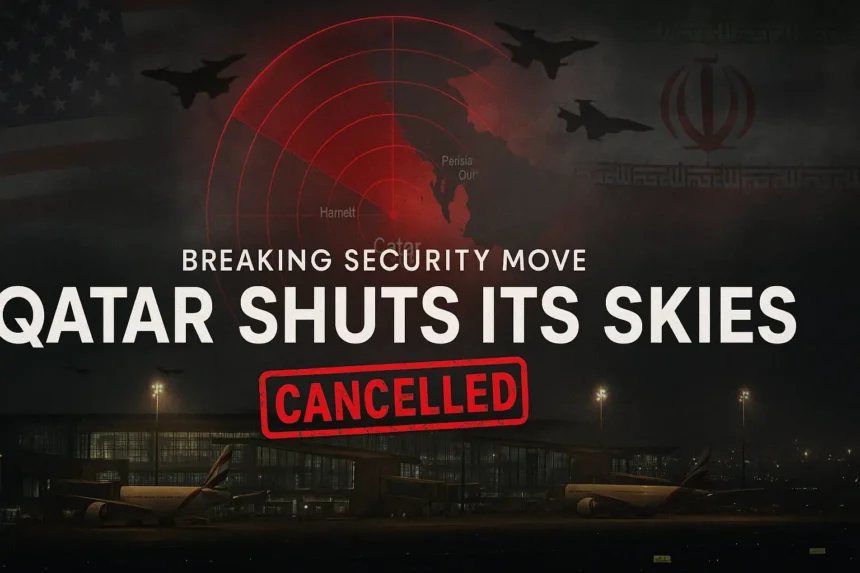Qatar Halted Flights Amid Iran-US Chaos: What You Need to Know
In a shocking move, Qatar halted all flights as tensions erupted between Iran and the US. With Tehran vowing retaliation after US strikes on Iranian nuclear sites, Qatar’s skies went silent — signaling a region on edge. This dramatic suspension hints at deeper fears unfolding across the Gulf, with global consequences looming.
Qatar Grounds All Flights Without Warning
Qatar just grounded all flights—no warning, no explanation. It’s home to the biggest U.S. military base in the Gulf, so when it goes silent, the world listens. Then came a chilling alert: the U.S. Embassy told Americans to shelter in place. Something big is unfolding, and no one knows exactly what—yet. Tensions are rising, fast.
Here’s everything you need to know about the unfolding crisis that’s gripping the Gulf and why Qatar’s sudden decision may be the calm before a much bigger geopolitical storm.
1. Qatar Grounds Flights Amid Escalating Gulf Tensions
In an unprecedented move, Qatar announced a temporary halt to all air traffic across its skies. The reason? Heightened regional threats following Iran’s warning of retaliation after US strikes targeted nuclear sites inside the Islamic republic.
The competent authorities announce the temporary suspension of air traffic in the country’s airspace, as part of a set of precautionary measures, said Qatar’s foreign ministry.
This strategic pause is more than just a safety precaution — it’s a loud signal of growing unease in the Gulf.
2. US Military Presence Turns Qatar Into a Pressure Point
Qatar’s Al Udeid Air Base hosts over 10,000 US troops, making it America’s largest military installation in the Middle East. Just 190 km from Iran, Qatar’s proximity makes it a prime target in any future retaliation from Tehran.
The US embassy’s warning to citizens was stark:
Out of an abundance of caution, we recommend American citizens shelter in place until further notice.
And it didn’t stop there — other embassies, including those of Britain and Canada, echoed the call, advising their nationals to stay indoors.
3. Iran’s Threat of “Unpredictable Consequences” Raises Global Alarm
On Monday, Iran’s military issued a grim warning:
There will be serious, unpredictable consequences for the United States, said Iran’s armed forces.
This wasn’t just rhetoric. The warning came after US-backed Israeli airstrikes reportedly hit three nuclear sites deep inside Iranian territory.
The fear? A chain reaction of reprisals that could spiral into a regional war, disrupting global oil and gas supply chains, air travel, and trade routes.
4. Embassies Go Into Emergency Mode Across the Gulf
Qatar wasn’t the only Gulf country on edge. In Bahrain, which hosts the US Fifth Fleet, the American embassy announced a shift to remote operations, with some staff now working from home.
Bahraini authorities also asked most government workers to work remotely, citing “regional circumstances.”
This wave of diplomatic caution signals one clear message: The Gulf is bracing for impact.
5. Qatar Insists It’s Safe — But Are They Downplaying the Risks?
Despite the warnings, Qatar’s Foreign Ministry Spokesman, Majed al-Ansari, urged calm.
Such statements by foreign embassies do not necessarily reflect the existence of specific or credible threats, he posted on X (formerly Twitter).
But many are asking: If there’s no real threat, why shut down the skies?
That contradiction is fueling speculation that more is happening behind the scenes than is being publicly admitted — and that Qatar may be working through diplomatic backchannels to de-escalate the crisis quietly.
What This Means for Global Travelers & Expats
With Qatar being a major international transit hub and host to tens of thousands of foreign workers, the sudden airspace shutdown isn’t just a local issue — it’s a global ripple effect in real time. From grounded flights to disrupted cargo and stranded travelers, here’s how this unfolding crisis could impact the world:
| Impact | Description |
|---|---|
| Flight Cancellations | Major airlines may cancel or reroute flights, affecting global travel schedules. |
| Stranded Passengers | Thousands could be stuck at airports in Doha and connecting hubs worldwide. |
| Cargo Disruption | Delays in critical cargo and supply chains, especially in time-sensitive industries. |
If the crisis deepens, expect more countries to issue travel advisories or restrict movements in the Gulf.
Is This the Prelude to a Bigger Conflict?
While Qatar is trying to calm fears, the silence of the skies speaks louder than any official statement. When embassies go on high alert and military bases prepare for the worst, the writing is on the wall.
The Israel-Iran conflict is no longer limited to borders — it’s beginning to pull Gulf nations into its vortex, and Qatar is standing dangerously close to the edge.
Final Thoughts: Caution Today, Crisis Tomorrow?
This isn’t just a flight freeze — it’s a geopolitical red flag. Qatar’s sudden airspace shutdown could be the spark that ignites a wider conflict involving the U.S., Iran, Israel, and Gulf powers. Behind the silence lies a brewing storm of shifting alliances, secret deals, and high-stakes military tension. The world isn’t just watching — it’s bracing.
Is this a warning shot or the calm before the storm?
Stay with TN HEADLINES24 for breaking updates as this global chessboard unfolds — piece by volatile piece.Follow TN HEADLINES24 for real-time updates, expert insights, and ground reports on the Middle East crisis. Bookmark our blog or subscribe for alerts so you never miss a critical update.
Most read: https://tnheadlines24.com/irans-hormuz-threat/
Also read: https://tnheadlines24.com/fordow-is-gone/
Disclaimer: The information presented in this article is based on publicly available sources and is intended for general awareness only. TN HEADLINES24 is not liable for the accuracy, completeness, or reliability of the content and shall not be held responsible for any actions taken based on the information provided herein.








